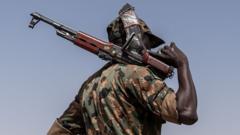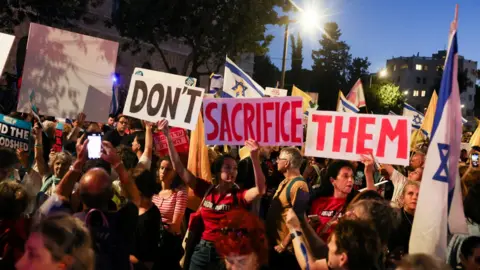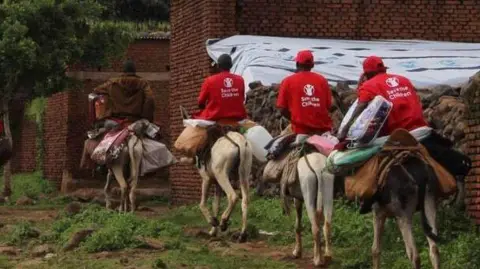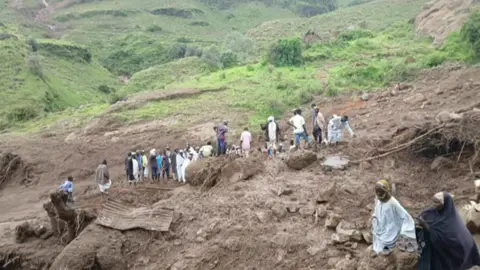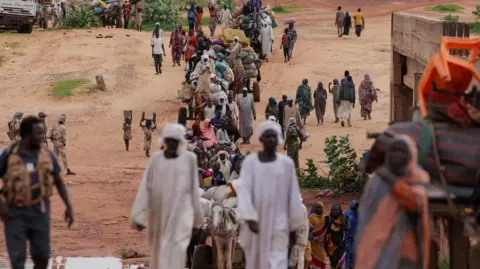In the heart of Sudan, the oil-rich Kordofan region has emerged as a pivotal front in the ongoing conflict between the national army and rival paramilitary forces. Both factions are locked in a fierce battle in a war that has ravaged the nation for over two years. Recent attacks have escalated tensions, inflicting severe casualties to civilians and shifting the military focus to securing control over this vital region.
Experts warn that whoever gains dominance over Kordofan will effectively control Sudan's oil resources and significantly influence the geopolitical landscape. "The stability of Kordofan is crucial not only for Sudan but for neighboring South Sudan, as oil from locked areas flows through pipelines here before it can be exported," explained Amir Amin, an analyst at Oasis Policy Advisory.
Since June, the intensity of military operations in Kordofan has heightened as the army aims to reclaim lost territory from the Rapid Support Forces (RSF), which has made substantial territorial gains since the war reignited in April 2023. Notably, the RSF had initially captured Khartoum, the capital, igniting a power struggle with army chief Gen. Abdel Fattah al-Burhan, who has not returned to the city since regaining control from RSF fighters.
The ongoing strife has resulted in staggering human costs, with approximately 150,000 reported dead and millions displaced, marking one of the most severe humanitarian crises in recent history. The RSF's swift occupation of Khartoum was a consequence of a fractured alliance between Burhan and the RSF commander, Gen. Mohamed Hamdan Dagalo, known as "Hemedti," exacerbating an already dire situation.
Experts note that the military's strategy in Kordofan is not simply about recapturing land; it's also about breaking the RSF's hold over the region to extend their influence into the west, specifically Darfur, where the RSF was born. Meanwhile, the RSF seeks to secure Kordofan to bolster its strategic position and potentially threaten Khartoum again.
Tensions have been fueled further by military airstrikes in West Kordofan that have drawn the ire of local populations. Reports indicate that these strikes resulted in civilian casualties, with over 20 fatalities in recent bombardments, prompting international condemnation. The strikes have not only stoked fears but have also drawn warnings from the RSF that retaliation against key oil sites could follow.
As the conflict unfolds, the United Nations and humanitarian organizations are increasingly vocal about the violence perpetrated against civilians. Recent data from UNICEF highlights the tragic toll on innocent lives, while satellite imagery has pointed to premeditated destruction in affected areas.
With impending RSF offensives aimed at capturing key areas such as el-Obeid in North Kordofan, the stakes are higher than ever. The small town of Umm Sumaima has witnessed frequent clashes, becoming a critical juncture that both forces aim to control.
As the battle for Kordofan continues, analysts caution that while its outcome may not entirely dictate the war's victor, it will certainly mark a critical turning point in a conflict that threatens to further unravel the already fragile state of Sudan.
Experts warn that whoever gains dominance over Kordofan will effectively control Sudan's oil resources and significantly influence the geopolitical landscape. "The stability of Kordofan is crucial not only for Sudan but for neighboring South Sudan, as oil from locked areas flows through pipelines here before it can be exported," explained Amir Amin, an analyst at Oasis Policy Advisory.
Since June, the intensity of military operations in Kordofan has heightened as the army aims to reclaim lost territory from the Rapid Support Forces (RSF), which has made substantial territorial gains since the war reignited in April 2023. Notably, the RSF had initially captured Khartoum, the capital, igniting a power struggle with army chief Gen. Abdel Fattah al-Burhan, who has not returned to the city since regaining control from RSF fighters.
The ongoing strife has resulted in staggering human costs, with approximately 150,000 reported dead and millions displaced, marking one of the most severe humanitarian crises in recent history. The RSF's swift occupation of Khartoum was a consequence of a fractured alliance between Burhan and the RSF commander, Gen. Mohamed Hamdan Dagalo, known as "Hemedti," exacerbating an already dire situation.
Experts note that the military's strategy in Kordofan is not simply about recapturing land; it's also about breaking the RSF's hold over the region to extend their influence into the west, specifically Darfur, where the RSF was born. Meanwhile, the RSF seeks to secure Kordofan to bolster its strategic position and potentially threaten Khartoum again.
Tensions have been fueled further by military airstrikes in West Kordofan that have drawn the ire of local populations. Reports indicate that these strikes resulted in civilian casualties, with over 20 fatalities in recent bombardments, prompting international condemnation. The strikes have not only stoked fears but have also drawn warnings from the RSF that retaliation against key oil sites could follow.
As the conflict unfolds, the United Nations and humanitarian organizations are increasingly vocal about the violence perpetrated against civilians. Recent data from UNICEF highlights the tragic toll on innocent lives, while satellite imagery has pointed to premeditated destruction in affected areas.
With impending RSF offensives aimed at capturing key areas such as el-Obeid in North Kordofan, the stakes are higher than ever. The small town of Umm Sumaima has witnessed frequent clashes, becoming a critical juncture that both forces aim to control.
As the battle for Kordofan continues, analysts caution that while its outcome may not entirely dictate the war's victor, it will certainly mark a critical turning point in a conflict that threatens to further unravel the already fragile state of Sudan.

